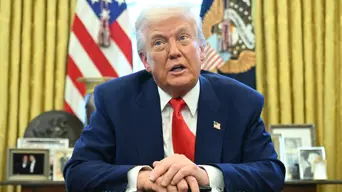How Trump’s tariff strategy could reshape global supply chains and African companies
South Africa will be slapped with a 30% tariff from 1 August, one of many African countries impacted by Trump's tariffs.

FILE: US President Donald Trump
Stephen Grootes speaks to Michael Hewson, director at Graphene Economics, about the potential significant impacts of US President Donald Trump's 30% tariff on exports from South Africa to the United States, effective August 1, 2025.
Listen to the interview in the audio player.
The clock is counting down to 1 August when the latest set of U.S tariffs are expected to come into effect against South Africa.
South African manufactured exports to the United States are due to be slapped with a 30% tariff, which will impact several sectors including agriculture and automotive.
Countries like South Africa that are facing the threat of tariffs now have to find alternative markets other than the U.S to avoid being impacted.
Speaking to Stephen Grootes on The Money Show, Michael Hewson, director at Graphene Economics says an option would be to reduce manufacturing, as demand for produce is likely to decline due to the the goods costing more in the U.S, effectively pricing them out the market.
He says exporting goods to the United States will no longer be competitive if a 30% tariff is applied.
"The one broad option is to either reallocate sales elsewhere, to other markets, but that's not always feasible. It takes a long time to enter into a new market. Build a relationship, knowledge and awareness of your product..."
- Michael Hewson, director - Graphene Economics
"We see companies asking, will they need to reduce production in South Africa, because they'll no longer have the demand in the U.S."
- Michael Hewson, director - Graphene Economics
"In the automotive sector, if you're a parts manufacturer, you're very dependent on these global value chains...but this uncertainty is unhelpful because global organisations are having to make investment decisions. And those investment decisions get made for a period of time. It's not like companies can switch on and switch off where production takes place."
- Michael Hewson, director - Graphene Economics
Scroll to the top of the article to listen to the full interview.